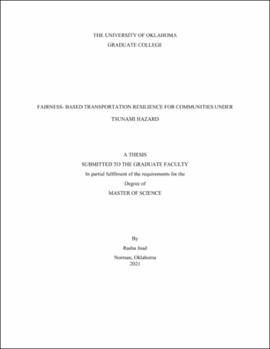Fairness-Based Transportation Resilience for Communities under Tsunami Hazard
| dc.contributor.advisor | Gonzalez, Andres | |
| dc.contributor.author | Jnad, Rasha | |
| dc.date.accessioned | 2022-01-10T15:05:52Z | |
| dc.date.available | 2022-01-10T15:05:52Z | |
| dc.date.issued | 2021-12 | |
| dc.identifier.uri | https://hdl.handle.net/11244/333673 | |
| dc.description.abstract | Abstract: Natural disasters such as tsunamis have catastrophic impacts on the functionality and resilience of transportation networks in impacted areas, and they can damage coastal regions hundreds of kilometers away from the earthquake that caused them, resulting in a significant number of casualties. As a result, the ultimate goal of this study was to develop a fair-based evacuation model under tsunami hazards. The proposed fairness-based evacuation model used in this study aimed to give evacuees equal access to emergency facility centers and assembly areas, reducing the number of casualties and assessing the capability of providing the evacuees' needs. | en_US |
| dc.language | en_US | en_US |
| dc.subject | Tsunami | en_US |
| dc.subject | Resilience | en_US |
| dc.subject | Fairness | en_US |
| dc.title | Fairness-Based Transportation Resilience for Communities under Tsunami Hazard | en_US |
| dc.date.manuscript | 2021-12 | |
| dc.thesis.degree | Master of Science | en_US |
| ou.group | Gallogly College of Engineering | en_US |
| shareok.nativefileaccess | restricted | en_US |
Files in this item
This item appears in the following Collection(s)
-
OU - Theses [2186]
